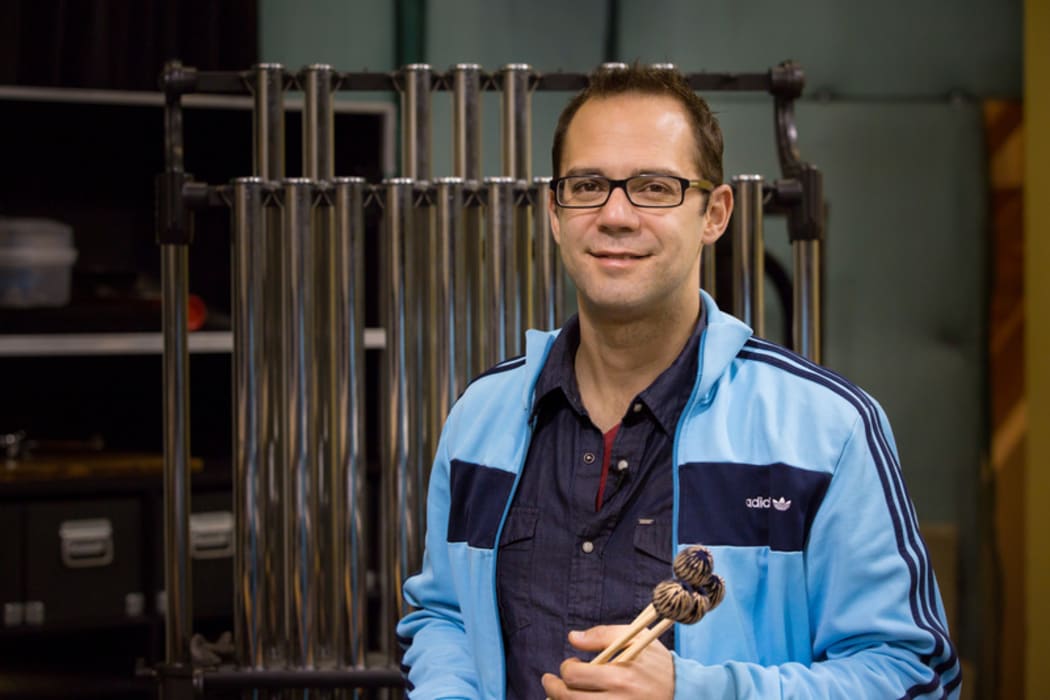Auckland Philharmonia Orchestra - The New World

Eric Renick, APO Principal Percussionist Photo: RNZ / Cole Eastham-Farrelly
The Auckland Philharmonia's Principal Percussionist, Eric Renick takes the front of the stage for a performance of Incantations by Finnish composer Einojuhani Rautavaara.
And the concert starts and ends with music from Bohemian composers Bedrich Smetana and Antonin Dvořák. Although in the case of Dvořák, it's his response - as the title of the concert suggests - to the New World of America.
The concert is conducted by Michał Nesterowicz from Poland.
Recorded Auckland Town Hall, 10 August 2017
Producer: Tim Dodd
Sound engineer: Adrian Hollay
Ma Vlast, or My Homeland, is a set of six Symphonic poems by Smetana. He wrote them in the late 1870s as depictions of his native Bohemia, the westernmost part of what we now call the Czech Republic. Vltava, or The Moldau is the most well-known of the six, and it describes the sounds of one of Bohemia’s great rivers, starting from two small springs, their unification into one stream, bringing forth Smetana’s most memorable tune, and passing through various landscapes, including one in which a farmer’s wedding is celebrated. The river continues through some dramatic rapids, then on towards Prague, finally vanishing into the distance.
The famous melody on which the piece is based isn’t actually original. Smetana adapted it from an Italian Renaissance tune, La Mantovana, and it’s even been used as the basis for the Israeli National Anthem.
Incantations, the Percussion Concerto by the Finnish composer Einojuhani Rautavaara. The piece dates from 2009, when it was commissioned for the famous Scottish percussionist Colin Currie. Much of Rautavaara’s work has a mystical aspect to it, and several of his works have titles which allude to angels; the “incantations’ referred to in this concerto’s title are inspired by the shamans of the Sami culture in Finnish Lapland. As the composer said, these shamans “want to act as a mediator between us humans and the transcendental world, often through the act of singing an incantation.” The concerto has three movements, with the self-explanatory titles 'Heavy', 'Expressive', and 'Animated'.
Dvořák’s Symphony No 9, 'From the New World' completes the bookend in this concert of two composers of Bohemian (or Czech) heritage. Despite Dvořák’s Bohemian heritage, the New World in question is of course the United States of America. It was the lure of an amazing fee that persuaded Dvořák to venture to New York in 1892. For a little teaching and conducting, with four month's vacation, he was promised the unimaginable salary of US$15,000 - 25 times what he was paid in Prague. By our calculations, this would be worth about 880,000 New Zealand dollars in today's terms.
While he was in the USA, he developed a new passion for steam ships to add to his obsessive interest in trainspotting, but he was also profoundly affected by the music he heard of the American Indians, and of African-American spirituals. It’s often said that Dvorak was also strongly influenced by America’s “wide open spaces”, and he said that the now famous title was meant to convey “impressions and greetings from the New World”. It immediately became one of the most popular and frequently-performed of all symphonies, and has remained so to this day.